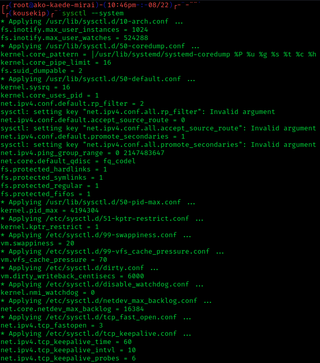poll is a POSIX system call to wait for one or more file descriptors to become ready for use. [1]
On *BSD and macOS, it has been largely superseded by kqueue in high performance applications. [2] On Linux, it has been superseded by ppoll and epoll. [2]

DragonFly BSD is a free and open-source Unix-like operating system forked from FreeBSD 4.8. Matthew Dillon, an Amiga developer in the late 1980s and early 1990s and FreeBSD developer between 1994 and 2003, began working on DragonFly BSD in June 2003 and announced it on the FreeBSD mailing lists on 16 July 2003.
In computing, busdma, bus_dma and bus_space is a set of application programming interfaces designed to help make device drivers less dependent on platform-specific code, thereby allowing the host operating system to be more easily ported to new computer hardware. This is accomplished by having abstractions for direct memory access (DMA) mapping across popular machine-independent computer buses like PCI, which are used on distinct architectures from IA-32 (NetBSD/i386) to DEC Alpha (NetBSD/alpha). Additionally, some devices may come in multiple flavours supporting more than one bus, e.g., ISA, EISA, VESA Local Bus and PCI, still sharing the same core logic irrespective of the bus, and such device drivers would also benefit from this same abstraction. Thus the rationale of busdma is to facilitate maximum code reuse across a wide range of platforms.
In Unix and Unix-like computer operating systems, a file descriptor is a process-unique identifier (handle) for a file or other input/output resource, such as a pipe or network socket.

lighttpd is an open-source web server optimized for speed-critical environments while remaining standards-compliant, secure and flexible. It was originally written by Jan Kneschke as a proof-of-concept of the c10k problem – how to handle 10,000 connections in parallel on one server, but has gained worldwide popularity. Its name is a portmanteau of "light" and "httpd".
libevent is a software library that provides asynchronous event notification. The libevent API provides a mechanism to execute a callback function when a specific event occurs on a file descriptor or after a timeout has been reached. libevent also supports callbacks triggered by signals and regular timeouts.
inotify is a Linux kernel subsystem created by John McCutchan, which monitors changes to the filesystem, and reports those changes to applications. It can be used to automatically update directory views, reload configuration files, log changes, backup, synchronize, and upload. The inotifywait and inotifywatch commands allow using the inotify subsystem from the command line. One major use is in desktop search utilities like Beagle, where its functionality permits reindexing of changed files without scanning the filesystem for changes every few minutes, which would be very inefficient.

sysctl is a software utility of some Unix-like operating systems that reads and modifies the attributes of the system kernel such as its version number, maximum limits, and security settings. It is available both as a system call for compiled programs, and an administrator command for interactive use and scripting. Linux additionally exposes sysctl as a virtual file system.

FreeBSD is a free and open-source Unix-like operating system descended from the Berkeley Software Distribution (BSD), which was based on Research Unix. The first version of FreeBSD was released in 1993. In 2005, FreeBSD was the most popular open-source BSD operating system, accounting for more than three-quarters of all installed and permissively licensed BSD systems.
select is a system call and application programming interface (API) in Unix-like and POSIX-compliant operating systems for examining the status of file descriptors of open input/output channels. The select system call is similar to the poll facility introduced in UNIX System V and later operating systems. However, with the c10k problem, both select and poll have been superseded by the likes of kqueue, epoll, /dev/poll and I/O completion ports.

The Berkeley Software Distribution or Berkeley Standard Distribution (BSD) is a discontinued operating system based on Research Unix, developed and distributed by the Computer Systems Research Group (CSRG) at the University of California, Berkeley. The term "BSD" commonly refers to its open-source descendants, including FreeBSD, OpenBSD, NetBSD, and DragonFly BSD.
Write Ahead Physical Block Logging (WAPBL) provides meta data journaling for file systems in conjunction with Fast File System (FFS) to accomplish rapid filesystem consistency after an unclean shutdown of the filesystem and better general use performance over regular FFS. With the journal, fsck is no longer required at system boot; instead, the system can replay the journal in order to correct any inconsistencies in the filesystem if the system has been shut down in an unclean fashion.
Kqueue is a scalable event notification interface introduced in FreeBSD 4.1 in July 2000, also supported in NetBSD, OpenBSD, DragonFly BSD, and macOS. Kqueue was originally authored in 2000 by Jonathan Lemon, then involved with the FreeBSD Core Team. Kqueue makes it possible for software like nginx to solve the c10k problem.
epoll is a Linux kernel system call for a scalable I/O event notification mechanism, first introduced in version 2.5.44 of the Linux kernel. Its function is to monitor multiple file descriptors to see whether I/O is possible on any of them. It is meant to replace the older POSIX select(2) and poll(2) system calls, to achieve better performance in more demanding applications, where the number of watched file descriptors is large (unlike the older system calls, which operate in O(n) time, epoll operates in O(1) time).

Bitflu is an open-source, BitTorrent client by Adrian Ulrich. It is available for Unix-like systems and is written in Perl.

libuv is a multi-platform C library that provides support for asynchronous I/O based on event loops. It supports epoll(4), kqueue(2), Windows IOCP, and Solaris event ports. It is primarily designed for use in Node.js but it is also used by other software projects. It was originally an abstraction around libev or Microsoft IOCP, as libev doesn't support IOCP on Windows. In node-v0.9.0's version of libuv, the dependency on libev was removed.
Enduro/X is an open-source middleware platform for distributed transaction processing. It is built on proven APIs such as X/Open group's XATMI and XA. The platform is designed for building real-time microservices based applications with a clusterization option. Enduro/X functions as an extended drop-in replacement for Oracle Tuxedo. The platform uses in-memory POSIX Kernel queues which insures high interprocess communication throughput.
The bio(4) pseudo-device driver and the bioctl(8) utility implement a generic RAID volume management interface in OpenBSD and NetBSD. The idea behind this software is similar to ifconfig, where a single utility from the operating system can be used to control any RAID controller using a generic interface, instead of having to rely on many proprietary and custom RAID management utilities specific for each given hardware RAID manufacturer. Features include monitoring of the health status of the arrays, controlling identification through blinking the LEDs and managing of sound alarms, and specifying hot spare disks. Additionally, the softraid configuration in OpenBSD is delegated to bioctl as well; whereas the initial creation of volumes and configuration of hardware RAID is left to card BIOS as non-essential after the operating system has already been booted. Interfacing between the kernel and userland is performed through the ioctl system call through the /dev/bio pseudo-device.
systat is a BSD UNIX console application for displaying system statistics in fullscreen mode using ncurses/curses. It is available on, and by default ships in the base systems of, FreeBSD, NetBSD, OpenBSD and DragonFly BSD. It was first released as part of 4.3BSD in 1986.
A virtual kernel architecture (vkernel) is an operating system virtualisation paradigm where kernel code can be compiled to run in the user space, for example, to ease debugging of various kernel-level components, in addition to general-purpose virtualisation and compartmentalisation of system resources. It is used by DragonFly BSD in its vkernel implementation since DragonFly 1.7, having been first revealed in September 2006, and first released in the stable branch with DragonFly 1.8 in January 2007. The long-term goal, in addition to easing kernel development, is to make it easier to support internet-connected computer clusters without compromising local security. Similar concepts exist in other operating systems as well; in Linux, a similar virtualisation concept is known as user-mode Linux; whereas in NetBSD since the summer of 2007, it has been the initial focus of the rump kernel infrastructure.
poll(2) in FreeBSD, NetBSD, OpenBSD and DragonFly BSD